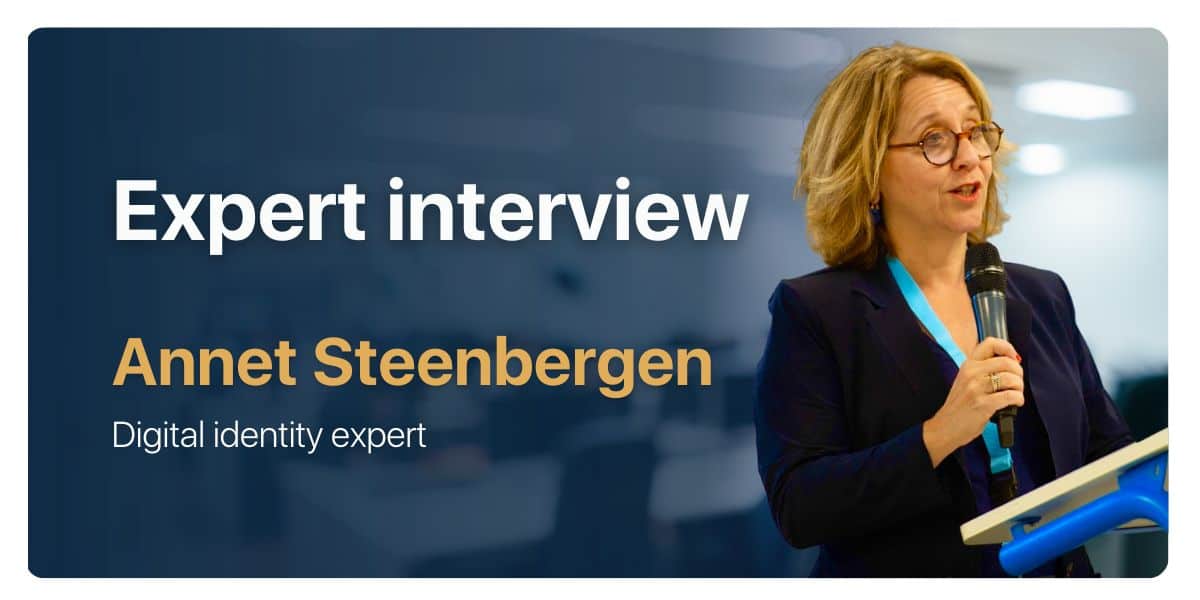Travel is stressful enough on its own. The risk of oversharing or losing control of your personal data, whether through endless forms, passport copies, or poorly secured systems, only makes it worse. Digital identity promises to change that, offering travelers a safer, simpler way to move through the world.
Few people know this space better than Annet Steenbergen, a digital identity expert with 25 years of experience in international border management and travel. She co-founded the seamless passenger facilitation program Aruba Happy Flow in 2015 and has become a leading voice on how trusted digital identities and biometrics can create safe, seamless, and privacy-respecting travel. Today, her focus lies on public-private cooperation and the transformative role of the EUDI Wallet in reshaping how we cross borders, check in to hotels, and interact with travel services.
For Annet, the impact of digital identity is twofold. For airlines, hotels, car rentals, and border authorities having accurate, verified data and only the data they need to have strengthens security. For travelers, it means less hassle, less data sharing, and more peace of mind. In other words: digital identity doesn’t just protect the system: it improves the experience.
The importance of getting it right
For digital wallets to succeed, they must be trustworthy, interoperable, and widely adopted. Europe’s EUDI Wallet is leading the way with strong privacy protections and open standards. But as Annet stresses: we need to think bigger.
Travel is by nature international. A wallet that works in Amsterdam or Madrid must also be recognized in Addis Ababa, Bangkok, or Buenos Aires. Encouragingly, countries beyond Europe, from Bhutan to Ethiopia, are already piloting digital identity systems aligned with global standards. True success will depend on this kind of cross-border cooperation.
Why tourism matters
Tourism will likely be one of the first sector where most people experience a digital wallet in practice. A single trip involves numerous identity checks: booking flights, crossing borders, checking into hotels, renting cars, or joining guided tours.
Because tourism spans so many touchpoints across public and private sectors, it provides the perfect testing ground. If wallets make air travel, hotel stays, and border crossings easier, travelers will adopt them quickly. Adoption in tourism, will support the use of the wallet spread to other areas such as healthcare, education, and beyond.
Practical use cases
So what does this look like in practice? The air travel industry is already experimenting with digital wallets to streamline check-in and boarding. In recent pilots, passengers were able to verify their identity with a few taps on their phone, while airlines received accurate, trusted data without the risk of typos or forged documents. This not only makes the journey smoother but also helps carriers comply with strict regulatory requirements.
Hotels face similar challenges. Today, many still rely on photocopies of passports or lengthy registration forms: processes that are not only cumbersome but also risky in terms of data protection. With a digital wallet, guests can share only the information that is legally required, instantly and securely. The result is faster check-in, better data quality for the hotel, and greater privacy for the traveler.
There are also promising developments in emergency travel documents. Losing a passport abroad currently means hours at an embassy waiting for a temporary paper replacement. In the near future, wallets could enable governments to issue a secure, digital emergency passport in minutes, valid just long enough to get a traveler home.
Beyond air and hotel use, tourism services are beginning to adopt wallet-based verification as well. In Spain, for example, a pilot project allowed Korean tourists to rent bikes using their digital identity wallet. For small businesses, this approach eliminates the need for expensive, tailor-made systems, while giving customers the reassurance that their data is safe.
Together, these examples illustrate how digital identity wallets address real pain points in travel. They replace outdated, insecure processes with faster, safer, and more reliable alternatives – benefiting both the traveler and the service provider.
The consumer perception problem – and the EU’s marketing challenge
Despite rapid technical progress, digital identity still faces a major hurdle: public perception. Many consumers worry that wallets will centralize their personal data in the hands of governments or corporations. In reality, the opposite is true. As Annet emphasizes, digital wallets are decentralized and user-controlled. Individuals decide exactly what to share, with whom, and only for as long as necessary. Instead of handing over a photocopy of an entire passport or completing insecure paper forms, travelers can share just the required attributes, and nothing more.
The irony is hard to miss. People hesitate to use a digital wallet, yet they freely give away far more personal information to online retailers or supermarket loyalty programs without a second thought. That disconnect highlights a communications gap. The EU and the Member States, Annet argues, has a clear marketing challenge ahead: to explain, in plain terms, how wallets work, why they are safer, and what safeguards exist. Without building public trust through clear messaging, adoption will remain slow: no matter how strong the technology is.
For policymakers, the task goes further than public awareness. They must build trust by introducing recognizable trust marks and by clearly explaining why digital systems are necessary in the first place: because they allow us to share less data, but better data. For border authorities, correct and early data improves border security and national safety and allows for a faster border crossing and less lines. For the tourism sector, it ensures smoother, more reliable experiences for travelers. As Annet puts it, digital identity is powerful precisely because it serves both goals at once: security and convenience.
Digital identity in tourism: a dual win
Digital identity in travel is not a trade-off. Done right, it offers a rare win-win: smoother journeys for travelers and faster and more secure border crossing. For border authorities, accurate, early data means better protection and more efficient checks. For tourists and business travelers, wallets remove friction at airports, hotels, and service counters, while keeping personal data private.
Success depends on keeping both goals in balance, Annet points out: “If we focus on making the journey easier ánd on improving security, that’s when we can start going places.”
The destination is clear: a future of seamless, trusted, and stress-free travel. The journey there depends on standards, global cooperation, and above all, building public trust.


